OXFORD PAPERBACK REFERENCE
Concise Oxford Companion to
The English Language

The most authoritative and up-to-date reference books for both students and the general reader.
Abbreviations
ABC of Music
Accounting
Art and Artists
Astronomy
Ballet
Bible
Biology
Botany
Business
Card Games
Chemistry
Christian Church
Classical Literature
Computing
Dates
Earth Sciences
Ecology
Economics
English Etymology
English Literature
English Place-Names
Euphemisms
Finance
First Names
Food and Nutrition
Fowlers Modern English Usage
Geography
Irish Mythology
Kings English
Law
Literary Terms
Mathematics
Medical Dictionary
Modern Quotations
Modern Slang
Music
Nursing
Opera
Philosophy
Physics
Politics
Popes
Popular Music
Proverbs
Quotations
Sailing Terms
Saints
Science
Ships and the Sea
Sociology
Superstitions
Theatre
Twentieth-Century History
Twentieth-Century Poetry
Weather Facts
Women Writers
Word Games
World Mythology
Zoology
*forthcoming
Concise Oxford Companion to
The English Language
Editor
TOM MCARTHUR
Assistant Editor
ROSHAN MCARTHUR


Great Clarendon Street, Oxford OX2 6DP
Oxford University Press is a department of the University of Oxford
It furthers the Universitys objective of excellence in research, scholarship
and education by publishing worldwide in
Oxford New York
Auckland Cape Town Dar es Salaam Hong Kong Karachi
Kuala Lumpur Madrid Melbourne Mexico City Nairobi
New Delhi Shanghai Taipei Toronto
With offices in
Argentina Austria Brazil Chile Czech Republic France Greece
Guatemala Hungary Italy Japan Poland Portugal Singapore
South Korea Switzerland Thailand Turkey Ukraine Vietnam
Oxford is registered trade mark of Oxford University Press
in the UK and in certain other countries
Published in the United States
by Oxford University Press Inc., New York
Tom McArthur 1992, 1998, 2005
The moral rights of the author have been asserted
Database right Oxford University Press (maker)
The Oxford Companion to the English Language first published 1992
Abridged Edition first published 1996
The Concise Oxford Companion to the English Language first published 1998
Reissued with new covers 2005
All rights reserved. No part of this publication may be reproduced,
stored in a retrieval system, or transmitted, in any form or by any means,
without the prior permission in writing of Oxford University Press,
or as expressly permitted by law, or under terms agreed with the appropriate
reprographics rights organization. Enquiries concerning reproduction
outside the scope of the above should be sent to the Rights Department,
Oxford University Press, at the address above
You must not circulate this book in any other binding or cover
and you must impose the same condition on any acquirer
British Library Cataloguing in Publication Data
Data available
Library of Congress Cataloguing in Publication Data
Data available
Typeset by SNP Best-set Typesetter Ltd, Hong Kong
Printed in Great Britain by
Clays Ltd, St Ives plc
ISBN 0-19-280637-8 978-0-19-280637-6
10 9 8 7 6 5 4 3 2 1
Contents
The evolution of the alphabet
Introduction
The Concise Oxford Companion to the English Language provides compact, comprehensive, up-to-date, and easily accessible information about key aspects of ENGLISH at the end of the twentieth century. Among other things, it covers: the distribution and varieties of english; its cultural, political, and educational impact worldwide; its nature, origins, and prospects; and its PRONUNCIATION, GRAMMAR, VOCABULARY, WORD-FORMATION, and USAGE. The aim has been to do this dispassionately without being bland, and in a scholarly fashion without being opaque, drawing on and distilling the unique international range of expertise that went into the original full-size Oxford Companion to the English Language (1992) and its abridged version (1996). The distinctive features of this edition include:
 The highlighting of key articles both at the beginning and in the body of the book, for easy reference
The highlighting of key articles both at the beginning and in the body of the book, for easy reference
 Information panels throughout the text, for example giving thumbnail accounts of the PLACE-NAMES of major English-speaking countries, as a means of highlighting particular topics
Information panels throughout the text, for example giving thumbnail accounts of the PLACE-NAMES of major English-speaking countries, as a means of highlighting particular topics
 Selective cross-referencing in small capitals in the body of the text (as in this introduction), as well as at the ends of entries
Selective cross-referencing in small capitals in the body of the text (as in this introduction), as well as at the ends of entries
 A chronology of English from 55 BC to AD 1997 (Appendix 1)
A chronology of English from 55 BC to AD 1997 (Appendix 1)
 An extensive thematic bibliography (Appendix 2)
An extensive thematic bibliography (Appendix 2)
The Concise Companion rests on the view that, in recent years, STANDARD ENGLISH has become a global resource that does not owe its existence, or the protection of its essence, to any one nation or group. Inasmuch as a particular LANGUAGE belongs to any individual or community, English is the possession of every individual and every community that uses it, regardless of what any other individual or community may think or feel about the matter. It is therefore intended as a resource for any person anywhere who is in any way involved with English.
There has been considerable discussion over the last two decades regarding the nature and use of English, and especially what Robert W. Burchfield has called its innumerable clearly distinguishable varieties (Introduction, vol. iv, A Supplement to the Oxford English Dictionary, 1986). Scholars have discussed both its usage (local, regional, and international) and its varieties (STANDARD and NON-STANDARD), while in broader public debate many people havesometimes anxiouslywondered whether the language might be going to the dogs, and be so over-extended around the world that it might break up into mutually unintelligible forms: that is, into a range of ENGLISH LANGUAGES.
The English language complex can however be viewed in several ways. Depending on the perspective we choose, it can be a single language or an aggregate of languages. The oneness of English is obvious in its standard worldwide printed form, but the manyness becomes equally clear when we compare and contrast that standard with the guid SCOTS tongue in Lowland Scotland and Northern Ireland, or with TOK PISIN (Talk Pidgin), one of the three official language of Papua-New Guinea, alongside English and Hiri Motu. To these we can add such traditional dialects as YORKSHIRE and NEWFOUNDLAND, such recently acknowledged NEW ENGLISHes as INDIAN ENGLISH and the varieties used in NIGERIA and SINGAPORE, and the many controversial ANGLO-HYBRIDS, such as SPANGLISH in the United States (blending SPANISH and English) and TAGLISH in the PHILIPPINES (blending TAGALOG and English).
Next page

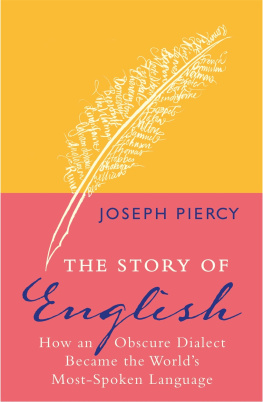
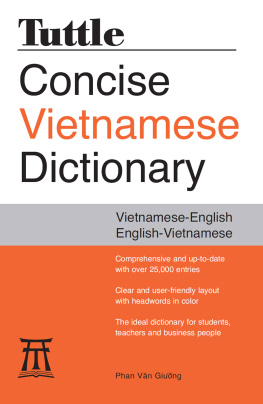
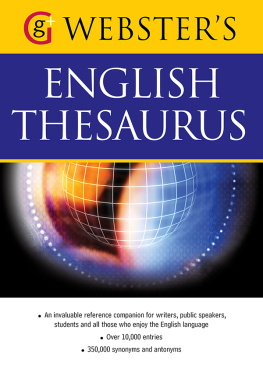
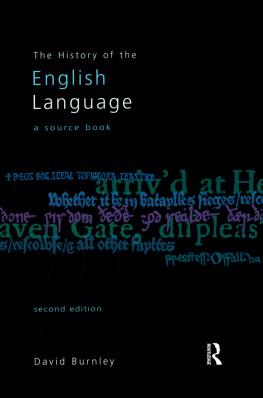
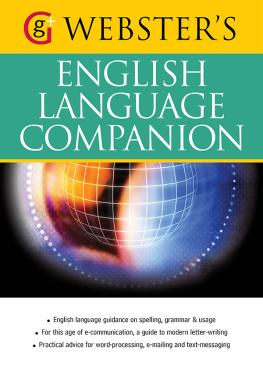
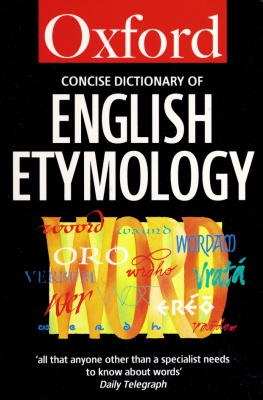
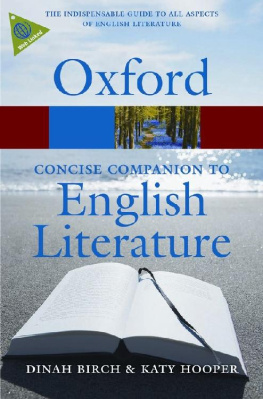
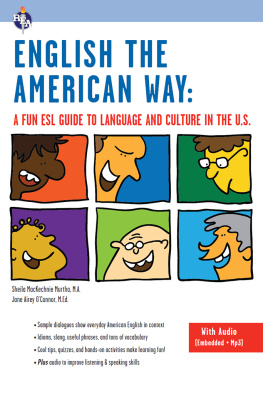
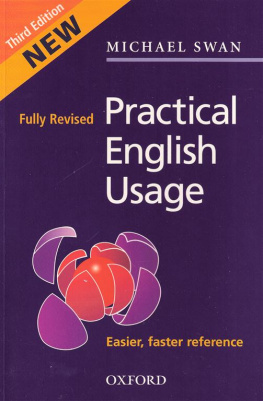




 The highlighting of key articles both at the beginning and in the body of the book, for easy reference
The highlighting of key articles both at the beginning and in the body of the book, for easy reference